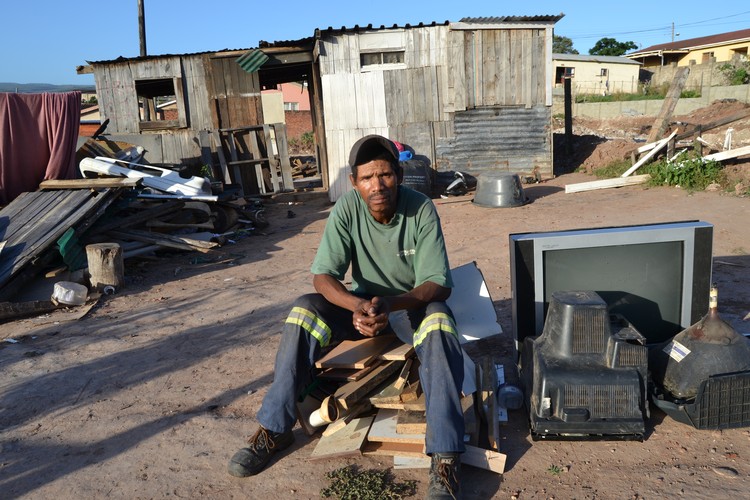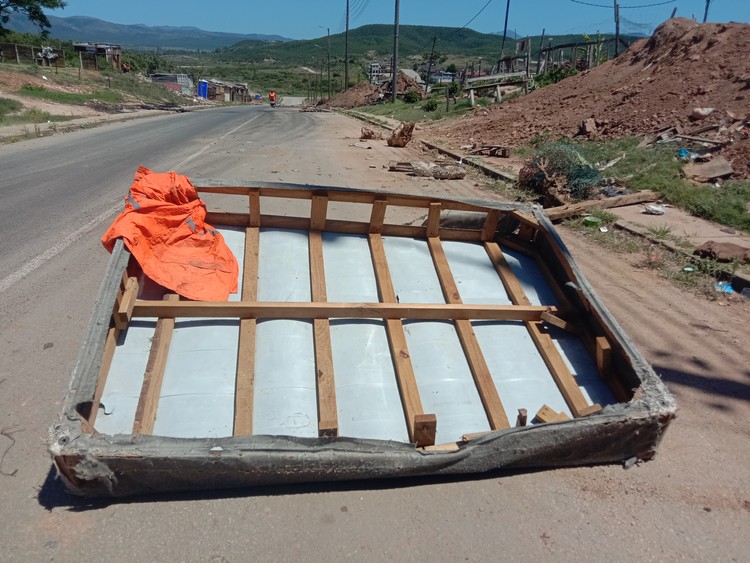Kariega land occupiers say municipality demolished their shacks illegally
Ten families who settled on land in 2019 have to move to make way for housing development
Peter Davids sits next to his furniture in Doornhoek informal settlement in Kariega. He says a group of municipal anti-land invasion workers started tearing down his shack while his baby was still inside. Photos: Thamsanqa Mbovane
- Families occupying municipal land in Kariega say they had to grab sleeping children from their beds when the Anti-Land Invasion Unit came to demolish their homes.
- It appears no eviction order was granted by the court.
- The Nelson Mandela Bay municipality intends to build houses on the land where the families have been occupying.
Masked workers from the Nelson Mandela Bay municipality’s Anti-Land Invasion Unit tore down several shacks in Doornhoek informal settlement in Kariega on Tuesday morning, apparently without an eviction order. The families had been given eviction notices in November and warned to move their homes across the road to a neighbouring plot. But they refused to do so until their ward councillor could provide a written promise that their move would be temporary, and they would receive housing.
After Councillor Lungile Langbooi refused to do so, their shacks were torn down. This is according to Doornhoek informal settlement residents speaking to GroundUp before a meeting with the mayor on Wednesday. At the meeting, it was confirmed by an Anti-Land Invasion Unit official that there was no eviction order from the court.
Affected resident Jacqueline Gouws told GroundUp: “There was a team of about 20 men wearing masks and reflectors … They were accompanied by the police and were carrying crossbars and sledgehammers while approaching our shacks.”
Gouws said her four-year-old granddaughter alerted her to the arrival of the police. “My other one-year one-month grandson was fast asleep when the team suddenly broke my shack … I sprang in action and took my grandson out immediately. His mother was at the clinic,” she said.
Doornhoek settlement is one of 156 informal settlements to be formalised in the Nelson Mandela Bay metro and the land is earmarked for the construction of 38 state subsidised houses.
The ten Doornhoek land occupiers received notices on 29 November, stating that they should remove their “illegal structures” within 14 days or the municipality would approach the courts for an eviction order.
“We asked the municipal officials and councillor to give us a guarantee that our relocation would be temporary, and that we would also get houses on the land we occupied,” said Ettienne Malgas.
On Wednesday afternoon, after hearing about the operation, Nelson Mandela Bay Mayor Gary van Niekerk met the ten families to discuss a way forward. The meeting was also attended by mayco member for economic development, tourism and agriculture, Shuling Lindtoor, wards 44 and 47 councillors Luzuko Ndamse (ANC), and Lungile Langbooi (ANC).
One of the occupier’s furniture left in the road after the shacks were demolished.
Doornhoek informal settlement community leader Hugh-Reece Wiliams said there was no eviction order from the court.
Williams said the ten families had been staying in Doornhoek since 2019. A year later, the municipality brought 37 other families to stay on the same land and provided electricity and water while warning the ten original occupiers to leave, he said.
At the meeting with the mayor, Anti-Land Invasion Unit official MaDonald Hlonyane said there was no eviction order. “We were only targeting two sacks to demolish them, and it ends there.”
Hlonyane said they “only went to Doornhoek to destroy two shacks” and the other shacks were broken down “at the instruction of some of the ten family members”.
“This was not an eviction. The families even asked us to carry their furniture to move to the opposite side of the road,” he said.
However, his claim was refuted by some of the occupiers at the meeting.
Langbooi told the meeting he wanted the Doornhoek housing project to proceed smoothly.
Langbooi said if more than 37 houses were built on the land, the ten original Doornhoek occupiers would have first priority as beneficiaries, although he could offer no guarantee.
Van Niekerk urged for calm and said, “We want to give you dignity. You must have access to water, electricity and other benefits. Informal settlements are jumping up all over the place and we are chasing a moving target.”
Next: Judge Makhubele contradicts Gauteng Judge President’s testimony
Previous: Cofimvaba parents protest after scholar transport cancelled
© 2024 GroundUp. This article is licensed under a Creative Commons Attribution-NoDerivatives 4.0 International License.
You may republish this article, so long as you credit the authors and GroundUp, and do not change the text. Please include a link back to the original article.
We put an invisible pixel in the article so that we can count traffic to republishers. All analytics tools are solely on our servers. We do not give our logs to any third party. Logs are deleted after two weeks. We do not use any IP address identifying information except to count regional traffic. We are solely interested in counting hits, not tracking users. If you republish, please do not delete the invisible pixel.




